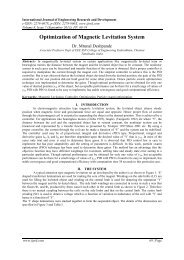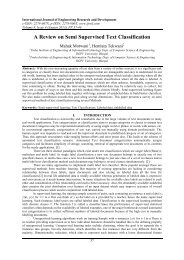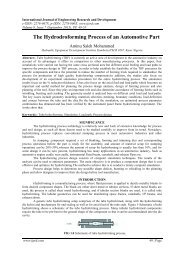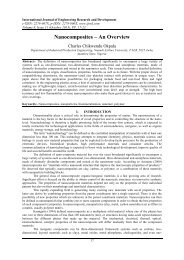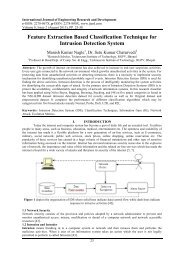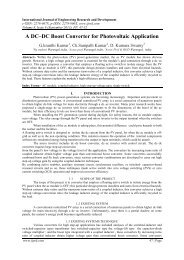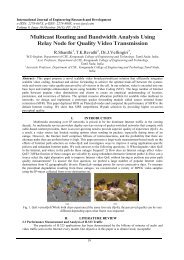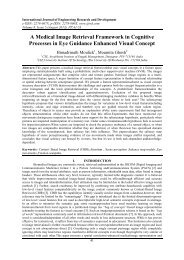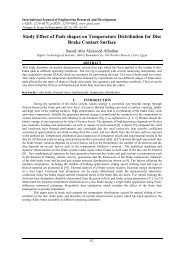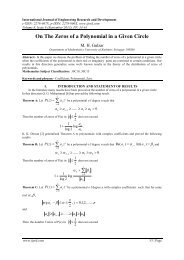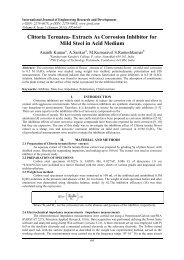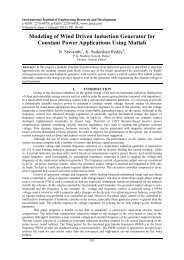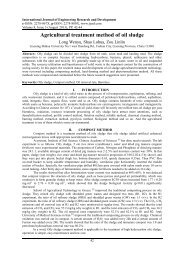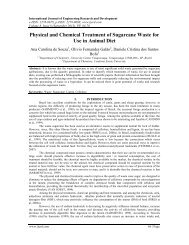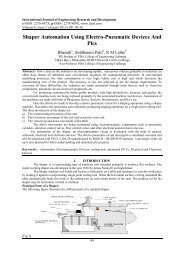The Coarticulation of Bi-Syllabic Words in Chinese
You also want an ePaper? Increase the reach of your titles
YUMPU automatically turns print PDFs into web optimized ePapers that Google loves.
Frequency (Hz)<br />
Frequency (Hz)<br />
Frequency (Hz)<br />
1000<br />
960<br />
920<br />
880<br />
840<br />
800<br />
1320<br />
1280<br />
1240<br />
1200<br />
1160<br />
1120<br />
1840<br />
1760<br />
1680<br />
1600<br />
1520<br />
<strong>The</strong> <strong>Coarticulation</strong> <strong>of</strong> <strong>Bi</strong>-<strong>Syllabic</strong> <strong>Words</strong> <strong>in</strong> Ch<strong>in</strong>ese<br />
Onset Middle Offset<br />
b. F1 for female speakers<br />
Onset Middle Offset<br />
c. F2 for male speakers<br />
Onset Middle Offset<br />
d. F2 for female speakers<br />
Figure 2: F1 (a and b) and F2 (c and d) values <strong>of</strong> the target vowel /a/ for male (a and c) and female (b<br />
and d) speakers, <strong>in</strong> the contexts <strong>of</strong> /a/ and /i/, measured at the onset, middle and <strong>of</strong>fset po<strong>in</strong>ts<br />
IV. DISCUSSION<br />
From the results reported <strong>in</strong> the previous section it is noted that, trans-segmental coarticulation does<br />
exist <strong>in</strong> Ch<strong>in</strong>ese, especially for the second formant value <strong>of</strong> the vowel. In this experiment, coarticulatory effect<br />
is exam<strong>in</strong>ed at the onset, middle and <strong>of</strong>fset po<strong>in</strong>ts <strong>of</strong> the target vowel respectively, and both the first and the<br />
second formant values are <strong>in</strong>vestigated. It is found that, as far as carry-over coarticulation is concerned,<br />
coarticulatory effect exists for the second formant values at the onset and the middle po<strong>in</strong>ts <strong>of</strong> the vowel. To be<br />
specific, at the onset and the middle po<strong>in</strong>ts <strong>of</strong> the vowel, there are significant differences between the two<br />
chang<strong>in</strong>g vowel contexts for the second formant, but not the first formant.<br />
<strong>The</strong> effect on the first and the second formants are not consistent with each other at the onset and the<br />
middle po<strong>in</strong>t <strong>of</strong> the target vowel, with F2 affected, while F1 unaffected. We speculate that the reason for this is<br />
that the difference between /a/ and /i/ for F2 is larger than that for F1. Accord<strong>in</strong>g to the report <strong>of</strong> Bao [24], the<br />
mean formant values by 8 male speakers are as follow, /a/: F1 = 984 Hz, F2 = 1157 Hz; /i/: F1 = 283 Hz, F2 =<br />
2350 Hz. <strong>The</strong> differences between /a/ and /i/ for F1 and F2 are 701 Hz and 1193 Hz respectively. <strong>The</strong> difference<br />
<strong>of</strong> F2 is much larger than that <strong>of</strong> F1. When the formant difference is large, the force for trigger<strong>in</strong>g the change <strong>of</strong><br />
course <strong>of</strong> formant contour is also large. That is to say, vowel coarticulatory effect is more likely to occur on<br />
cases with great formant difference, therefore, it occurs on F2, not on F1.<br />
When the <strong>of</strong>fset po<strong>in</strong>t <strong>of</strong> the target vowel is <strong>in</strong>vestigated, it is found that coarticulatory effect does not<br />
exist. That is, for either F1 or F2, there is no coarticulatory effect. This result is caused by the „distance effect‟: at<br />
the onset and the middle po<strong>in</strong>ts, the distance from the measured po<strong>in</strong>t to the chang<strong>in</strong>g vowels is close, and the<br />
effect exists; while at the <strong>of</strong>fset po<strong>in</strong>t, the distance gets farther, and the effect disappears.<br />
8<br />
/a/<br />
/i/<br />
/a/<br />
/i/<br />
/a/<br />
/i/




